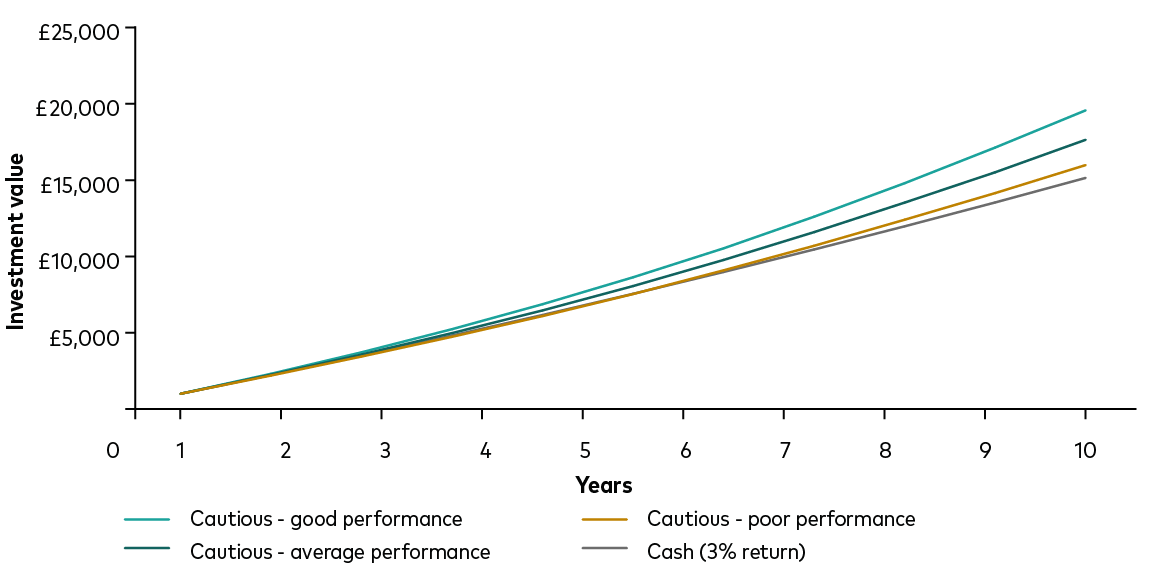
Why holding too much cash could cost you
While cash is useful for emergencies and short-term expenses, holding too much can erode your wealth and prevent you from achieving your longer-term goals.
Although UK interest rates have been steadily falling since the summer of 2024, they remain significantly higher than they were in the decade prior to 2022. The Bank of England, like many other central banks, began increasing interest rates at the end of 2021 to combat soaring prices for goods and services.
For this reason, holding cash might still seem attractive relative to investing. A recent Vanguard study1 found that many investors were holding large amounts of cash in their self-managed individual savings accounts (ISAs) before moving to our Managed ISA service.
Unlike shares and bonds2, cash savings don’t experience swings in prices or the risk of capital loss. However, holding too much cash could erode your wealth over time as your money loses its purchasing power, which we’ll explain later. This could hinder your ability to achieve your long-term financial goals.
Emergency cash holdings
Before we get to that, however, it’s important to note why holding some cash is useful – and that is for emergencies.
At Vanguard, we suggest maintaining emergency savings to give you peace of mind and help you avoid taking out short-term, high-cost debt. For one-off expenses, one rule of thumb is to keep the greater of £2,000 or half a month’s expenses in a bank account.
We also suggest having three to six months’ worth of outgoings put aside in case of an income shock – if you or your partner are made redundant, for example.
Cash is also useful for goals that are less than five years away, as it avoids the risk of a stock market decline depleting your wealth just before you need it. However, for longer-term goals your savings can lose value due to the impact of rising prices, otherwise known as inflation.
Inflation risk
Inflation is a crucial factor to consider because it can erode your money’s purchasing power and impact your ability to reach your goals as quickly as you’d like.
Although some savings accounts currently offer rates that are higher than inflation, it’s important to consider the longer-term picture. Shares and bonds have historically delivered better returns than cash over long periods and have outpaced inflation by a larger margin.
The table below shows the average annual returns from cash, bonds and shares since 1901, both before and after inflation. Global shares returned 5.34% a year after inflation, compared with 1.36% for bonds and only 0.89% a year for cash.
Long-term returns from cash, bonds and shares – before and after inflation
Average annual returns 1901-2024
|
Before inflation |
After inflation |
Cash |
4.56% |
0.89% |
Bonds |
5.05% |
1.36% |
Shares |
9.17% |
5.34% |
Past performance is not a reliable indicator of future results.
Notes: Returns are in pounds sterling with dividends and income reinvested. UK Treasury bills are used as a proxy for cash.
Source: Vanguard using Dimson-Marsh-Staunton global returns data from Morningstar. Data covers the period from 31 December 1900 to 31 December 2024.
The value of investments can go down as well as up and there is a risk that you will get back less than you invest. But over the long term, investors have been rewarded for this additional risk with better inflation-adjusted returns. This is also known as the ‘risk premium’.
Bonds can help to offset some of the short-term swings in share prices. They tend to offer lower but more stable returns over time.
Even a cautious investor can outperform cash
Some investors – particularly those just starting out – may worry about losing their money and therefore end up holding more cash than they need. While you won’t lose your money if you remain in cash, you risk missing out on investment growth that could help you reach your goals faster.
This doesn’t mean you should take more investment risk than you’re comfortable with. Understanding your attitude to risk is crucial because it helps you build a portfolio that’s right for you. Our research shows that even those with a low risk tolerance can outperform cash over long periods.
We compared the projected returns of a cash savings account paying an interest rate of 3% with the projected returns for a ‘cautious’ portfolio3 over 10 years, starting with an initial deposit of £1,000 and a regular payment of £100 per month.
We looked at three different scenarios for the cautious portfolio:
- ‘Poor’ performance: a pessimistic projection of returns where the portfolio is worth £15,939 after 10 years before costs. In reality, there is a three in four chance that a cautious portfolio will perform better than this.
- ‘Average’ performance: a realistic projection of returns where the portfolio is worth £17,590 after 10 years before costs, representing the median or ‘middle’ outcome.
- ‘Good’ performance: an optimistic projection of returns where the portfolio is worth £19,514 after 10 years before costs. In reality, there is a three in four chance that a cautious portfolio will perform worse than this.
As the chart below shows, even the ‘poor’ performance scenario outperforms cash, which is worth £15,101 after 10 years. This means that a relatively cautious investor who is willing to commit their money for the long term could be better off investing, even if the markets disappoint.
Cash versus cautious portfolio

Source: Vanguard calculations using forecasts from the Vanguard Capital Markets Model (VCMM) for a ‘cautious’ portfolio containing 47% shares and 53% bonds as at 31 December 2024. The return assumptions depend on current market conditions and, as such, may change over time. Fees have not been included, so actual returns could be lower.
IMPORTANT: The projections or other information generated by the VCMM regarding the likelihood of various investment outcomes are hypothetical in nature, do not reflect actual investment results, and are not guarantees of future results. Distribution of return outcomes from the VCMM are derived from 10,000 simulations for each modelled asset class. Simulations are as at 31 December 2024. Results from the model may vary with each use and over time. For more information, please see the section below.
You don’t need to have a high tolerance for risk to invest, but it is important to understand what your tolerance is and align your investments accordingly.
You can build a portfolio yourself by choosing from our wide range of low-cost individual funds. Or you can keep things simple by picking one of our five LifeStrategy funds, which mix bonds and shares to balance risk and reward.
Alternatively, when you sign up for our Managed ISA service, we ask a simple set of questions to determine your risk tolerance. We then select a portfolio of investments that aligns with your profile. Fees apply to our managed service.
1 Data collected from 455 Vanguard Managed ISA clients who transferred from our ‘do it yourself’ ISA since the launch of Managed ISA in December 2022 to October 2024.
2 Bonds are a type of loan issued by governments or companies, which typically pay a fixed amount of interest and return the capital at the end of the term.
3 A cautious portfolio is defined here as one with 47% shares and 53% bonds invested in a globally diversified range of funds.
IMPORTANT: The projections or other information generated by the Vanguard Capital Markets Model® regarding the likelihood of various investment outcomes are hypothetical in nature, do not reflect actual investment results, and are not guarantees of future results. VCMM results will vary with each use and over time. The VCMM projections are based on a statistical analysis of historical data. Future returns may behave differently from the historical patterns captured in the VCMM. More important, the VCMM may be underestimating extreme negative scenarios unobserved in the historical period on which the model estimation is based.
The Vanguard Capital Markets Model® is a proprietary financial simulation tool developed and maintained by Vanguard’s primary investment research and advice teams. The model forecasts distributions of future returns for a wide array of broad asset classes. Those asset classes include US and international equity markets, several maturities of the U.S. Treasury and corporate fixed income markets, international fixed income markets, US money markets, commodities, and certain alternative investment strategies. The theoretical and empirical foundation for the Vanguard Capital Markets Model is that the returns of various asset classes reflect the compensation investors require for bearing different types of systematic risk (beta). At the core of the model are estimates of the dynamic statistical relationship between risk factors and asset returns, obtained from statistical analysis based on available monthly financial and economic data from as early as 1960. Using a system of estimated equations, the model then applies a Monte Carlo simulation method to project the estimated interrelationships among risk factors and asset classes as well as uncertainty and randomness over time. The model generates a large set of simulated outcomes for each asset class over several time horizons. Forecasts are obtained by computing measures of central tendency in these simulations. Results produced by the tool will vary with each use and over time.
The primary value of the VCMM is in its application to analysing potential client portfolios. VCMM asset-class forecasts—comprising distributions of expected returns, volatilities, and correlations—are key to the evaluation of potential downside risks, various risk–return trade-offs, and the diversification benefits of various asset classes. Although central tendencies are generated in any return distribution, Vanguard stresses that focusing on the full range of potential outcomes for the assets considered, such as the data presented in this paper, is the most effective way to use VCMM output.
The VCMM seeks to represent the uncertainty in the forecast by generating a wide range of potential outcomes. It is important to recognise that the VCMM does not impose “normality” on the return distributions, but rather is influenced by the so-called fat tails and skewness in the empirical distribution of modelled asset-class returns. Within the range of outcomes, individual experiences can be quite different, underscoring the varied nature of potential future paths. Indeed, this is a key reason why we approach asset-return outlooks in a distributional framework.
Investment risk information
The value of investments, and the income from them, may fall or rise and investors may get back less than they invested.
Past performance is not a reliable indicator of future results.
Any projections should be regarded as hypothetical in nature and do not reflect or guarantee future results.
The eligibility to invest in either ISA or Junior ISA depends on individual circumstances and all tax rules may change in future.
For further information on risks please see the “Risk Factors” section of the prospectus on our website.
Important information
Vanguard only gives information on products and services and does not give investment advice based on individual circumstances. If you have any questions related to your investment decision or the suitability or appropriateness for you of the product[s] described, please contact your financial adviser.
For further information on the fund's investment policies and risks, please refer to the prospectus of the UCITS and to the KIID before making any final investment decisions. The KIID for this fund is available, alongside the prospectus via Vanguard’s website.
This is designed for use by and is directed only at persons resident in the UK.
The information contained herein is not to be regarded as an offer to buy or sell or the solicitation of any offer to buy or sell securities in any jurisdiction where such an offer or solicitation is against the law, or to anyone to whom it is unlawful to make such an offer or solicitation, or if the person making the offer or solicitation is not qualified to do so. The information is general in nature and does not constitute legal, tax, or investment advice.
Vanguard will manage your investments in the Managed ISA on your behalf. You will not be able to place trades on your own account.
The Authorised Corporate Director for Vanguard LifeStrategy Funds ICVC is Vanguard Investments UK, Limited. Vanguard Asset Management, Limited is a distributor of Vanguard LifeStrategy Funds ICVC.
Issued by Vanguard Asset Management Limited, which is authorised and regulated in the UK by the Financial Conduct Authority.
© 2025 Vanguard Asset Management Limited. All rights reserved.
4270194


